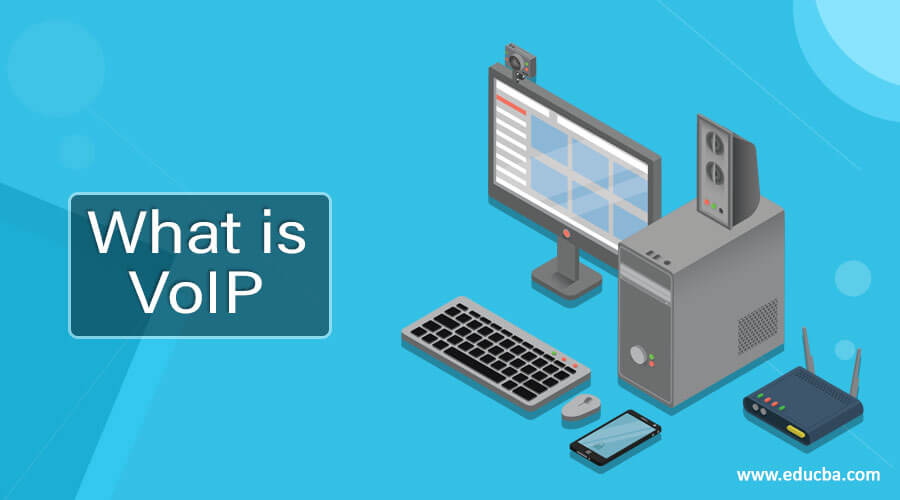
Introduction to VoIP
Voice over Internet Protocol ( VoIP) is also known as Voice over IP, IP technology, Wireless telephony, Wireless telephone, broadband telephone, and digital telephone. It is a protocol that offers telecommunications access over telecommunications. Instead of an analogue (or regular) phone line, this protocol allows us to make voice calls over the internet and transfer multimedia via a broadband internet network. Your phone calls are translated into data transmitted through your high-speed Internet. There are some benefits of VoIP phone service over standard mobile service, which we will explore later.
How does VoIP work?
VoIP uses codecs to encapsulate audio into data packets, send packets over an IP network, and encapsulate packets back into audio at the other end of the link. VoIP eliminates the expense of network connectivity by reducing the use of circuit-switched voice networks, allowing operators to provide voice services over their broadband and private networks and encouraging businesses to run a single voice and data network. Additionally, VoIP monitoring enhances this technology by enabling real-time tracking of call quality and performance, ensuring reliable communication even during network outages and facilitating quick failover between endpoints.
Benefits
Although VoIP is an outstanding user choice, the business gets the most benefits. Companies may use the multiple characteristics of VoIP phones to be more effective in everyday communication.
For small companies with a handful of staff, conventional analogue lines are ideal, but enterprises that make long-distance calls daily or have multiple contacts are best served using VoIP.
You can run your company on the drive, listen in from your mobile device for meetings, and never miss a beat. You can even move a call from your mobile phone to your office line smoothly without disturbing the conversation.
For example, unrestricted texting and faxing will help circumvent mobile and conventional toll rates for international and long-distance phone calls. VoIP phones can use only the required storage during a call, allowing you to save on data consumption.
Virtual connectivity makes it simpler than ever for workers to communicate effortlessly with each other, clients, and consumers from their laptops. It’s also possible to forward calls to mobile devices.
Needs in VoIP
Many people think that costly and complicated equipment is needed for VoIP. That’s not the case! You would require some equipment to take advantage of VoIP facilities and functionality, but you can opt to scale up the equipment or keep it reasonably basic. They need a phone, a quick internet connection, and VoIP service if a user only needs simple functionality. Some services now provide a service with a virtual number that allows customers to receive calls from their mobile phones.
Additional hardware that you may need:
- Microphone
- Online faxes
- Webcam
Best VoIP Service
Using a cloud phone system brings to your company an aspect of integrity and durability. Not all services are, though, the same. You would need to weigh your business needs to determine which business phone service fits well for you. You will need to consider what priorities you have before finding a company telecommunications service. Do you intend to utilize the same telephone system, or switch to something like VoIP and ask what is VoIP? Can you choose an in-house VoIP hosting service or opt for a full cloud service? To decide which strategy you will require, you must look at the present and future call volumes for yourself and the staff. Consider solutions for scalability so that you can expand smoothly.
VoIP Business Applications
Businesses use VoIP goods and facilities to minimize prices and operational expenses for telecommunications equipment. IP-based PBXs and, more recently, IP-based Unified Communications (UC) implementations have been replaced by standard office telephone systems such as digital key systems and PBXs that support voice and other real-time communication modes, including video and text messages. Its programs and facilities allow operational IT organizations to reduce spending on office-to-office calls by bringing internal calls via the corporate IP service network. It also minimizes running costs for contact centers by moving site-to-site calls over the business IP data network and reducing the expense of telecommunications by transmitting voice and data through the same wiring plant.
Providers of VoIP
Here are the following providers mentioned below:
1. GoToConnect
The best VoIP service provider available is GoToConnect. It offers end-to-end security facilities and supports CRM integration, audio and video conferencing, VoIP calls, and texting. Mobile, On Mac, Android, and iPhone GoToConnect installs itself. It offers online assistance 24/7.
2. Dialpad
Dialpad offers the latest services for business contacts online. This service provider offers SMS, MMS, call routing, HD video, and audio conferencing facilities. Its programs for its clients are available 24/7. It requires various help for workplaces, convergence with Salesforce, Zendesk, and Slack.
3. Aircall
Aircall is one of the biggest industry suppliers of VoIP services. It offers a full contact center solution for calls, photographs, and tweets. It is a simple configuration call center that incorporates various Salesforce, CRM, Zoho, Freshdesk, Zendesk, and Slack.
4. DialerHQ
DialerHQ, a leading cloud-based phone system, offers a user-friendly interface for simplified call management. With 50+ features and integration with over 100+ tools, it allows users to create automated workflows. With DialerHQ, businesses can get virtual phone numbers, including USA virtual phone numbers, from its extensive selection of over 80 countries.
Recommended Articles
We hope that this EDUCBA information on “What is VoIP” was beneficial to you. You can view EDUCBA’s recommended articles for more information.
